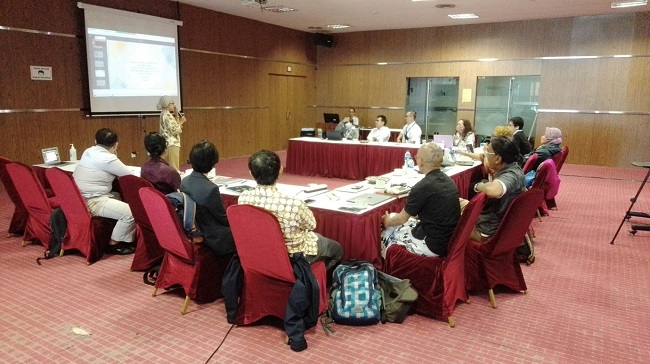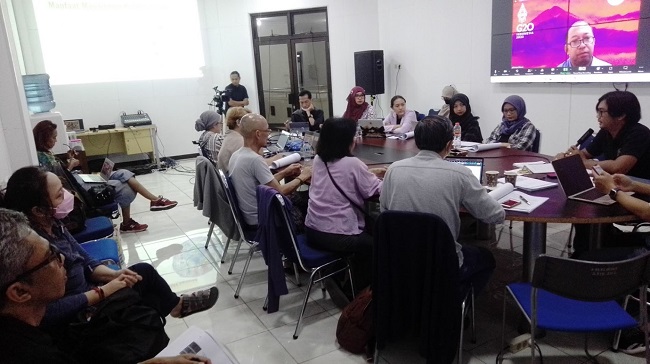Evi Eliyanah, Novi Kurnia, IGAK Satrya Wibawa, Tito Imanda
Versi Bahasa Indonesia
For the past three years the push to address gender-based abuses and discrimination in the Indonesian film industry has been intensifying. This call for change in the industry is inseparable from the rise of the 'Me Too' movement globally, and part of the ongoing struggle for gender equality in post New Order Indonesia. On a broader social scale, this movement also highlights other forms of discrimination against and exclusion of individuals representing minority groups in Indonesian cinema, both on and behind the screen.
As educators who teach film in tertiary education institutions, this social change made us begin to question the extent to which values and practices of equality and inclusion are taught in film education in Indonesia. After collective reflection, it was clear that the film education curriculums and environments, including in our own institutions, do not equip students with the awareness, knowledge and skills they need to support gender equality and social inclusion and prevent sexual abuse and discrimination. It was also clear that current curriculums and environments do not protect those who are from minority and marginalised groups against similar abuses.
As a group of researchers representing KAFEIN (Association of Indonesian Film Scholars) and with the support of UNESCO (United Nations Educational, Scientific and Cultural Organization), we embarked on a collective process of producing a guidebook. The aim was to assist film lecturers and policy makers active in tertiary education to offer a curriculum in which gender equality and social inclusion (GESI) is supported and responded to. The ultimate goal is to produce GESI-aware graduates who are also equipped with the tools to act when necessary.
Mapping the problems
Our study began by mapping diversity (or lack thereof) and inequalities in the Indonesian film industry – not only on the screen but also behind it. We then examined the extent to which GESI perspectives were integrated in existing film study programs’ curriculum and infrastructure, and identified where improvements could be made. We invited film lecturers to complete a questionnaire about their current teaching practice and the existing curriculum and infrastructure in their schools. We also invited lecturers, filmmakers and members of the BPI (Indonesian Film Board) to join focus groups, so we could understand not only the limitations within the existing curriculum but also their expectations for future developments. The results of these investigations formed the basis for the guidebook.

Gender disaggregated data produced by KAFEIN demonstrates relatively equal participation of men and women in film education in Indonesia, but not in employment in the film industry. Female students were more likely to outperform male students in completing their studies and receiving scholarships but, in the workforce, the percentage of women involved in the film industry remains relatively low at less than 20 percent. Since 1955, women filmmakers constitute just eight percent of filmmakers who have received awards at the prestigious FFI (Indonesian Film Festival). Minority groups by religion, ethnicity and sexuality are also underrepresented across all sectors. In other words, Muslim, abled, heterosexual men representing major ethnic groups in Indonesia tend to dominate decision-making positions in the industry. This lack of diversity within the industry leads to less variation in representations of female and non-heteronormative gender, sexuality, disability, minority religions and ethnicities on film.
Our discussions with film lecturers and PROSFISI (Association for Film and Television Study Programs in Indonesia) showed that the GESI perspective is limited, if not completely absent, in both the content and structure of film study programs and curriculums. The discussions also highlighted issues within the teaching methodology, such as the use of teacher-oriented methods rather than student-oriented methods, as well as a lack of GESI awareness and potential biases in teaching practices.
First steps
After analysing our research findings we prepared the first draft of the guidebook entitled Perspektif Gender dan Inklusi Sosial dalam Kurikulum, Pengajaran, dan Lingkungan Belajar dalam Program Studi Film di Indonesia (Gender Equality and Sosial Inclusion (GESI) Perspectives in Curriculum, Teaching and Learning Environments in Film Education in Indonesia). We began with an introduction to the basic theories and concepts related to gender, sexuality and equity. We are aware that potential users may not know how to identify the difference between biological and social constructions of gender and sexuality, or be aware of the power relations between genders and sexualities, and how they unfold in the context of film as an industry and cultural product. We then laid out some of the practical ways that film study programs can contribute to creating equal and inclusive cinema.
Specific to curriculum development, we offered a macro-level approach in which concerted efforts are made to revise the curriculum document, offer a special course or enrich the existing courses with values and practices of equality and inclusion. At the micro level, considering lecturers’ autonomy in designing their courses, we detailed how individual lecturers can personally contribute to producing socially-aware filmmakers by making sure that the courses they teach incorporate values and practices of equality, diversity and inclusion.
We also focused on how relevant stakeholders in film study programs can provide infrastructure – from buildings and human resources to services – that accommodate a diversity of genders, sexualities, religions, abilities and ethnic identities. They might not have to start from scratch but can modify the existing infrastructure to make minority and marginalised groups feel welcome and an integral part of the academic community.
Solidarity
After completing the first draft of the guidebook, we conducted two three-day workshops in October and November 2022 to disseminate the research findings and gather feedback from film lecturers, the potential users of the guidebook.
The workshop participants were very grateful – not only for our efforts to provide concrete support for redesigning existing curriculums and making improvements to infrastructure but also for our creation of such a safe space for discussion about how film education has dealt with inequalities and exclusion.

Our discussions with educators also made it very clear that providing a resource like the guidebook was only a small step on the path to making improvements in our field of study and the industry more broadly. We identified three major and ongoing challenges to incorporating GESI perspectives in curriculum design and infrastructure development in our institutions. They relate to lack of training and resources, hurdles around cultural sensitivity and social norms, and limited support from key stakeholders.
Ongoing obstacles
A lack of competent human resources means that lecturers had not received specific training in GESI, let alone support to incorporate GESI values and strategies in their teaching and filmmaking practices. As such, our respondents greatly appreciated the prospect of an ongoing and collective process among film lecturers to assist them to codesign curriculums and courses as well as pool relevant teaching materials. The guidebook was considered an important starting point for this collaboration, and includes resources such as a reading list to assist lecturers in compiling material.
The lecturers greatest concerns, however, related to cultural sensitivity and taboos around certain GESI issues, such as sexuality, harassment and discrimination. Not only did they have trouble accessing relevant materials, but social norms meant they also found it difficult to discuss these issues with their students and colleagues. In response to this, we strengthened a section in the guidebook calling for universities to establish a specific unit that focusses on prevention of discrimination and harassment and work towards resolution should they occur.
It also became clear that educating lecturers and disseminating the GESI guidelines to them would not be enough, on its own, to effect change. It was clear that engaging with key stakeholders in an ongoing and sustainable way was imperative. Following the publication of the guidebook, we plan to shift our focus to promoting multi-stakeholder dialogue and collaboration.
Mainstreaming GESI in film education in Indonesia must be a collective effort for the sake of creating a film industry that is safe, equal and inclusive for all individuals regardless of their identity. Film education plays an important part in producing future film generations who are aware of and responsive to gender equality and social inclusion. In the future, this endeavour must also engage with more industry stakeholders, including the national decision-making institutions.
Evi Eliyanah is an associate professor in gender studies at Universitas Negeri Malang (UM), Indonesia. Novi Kurnia is an associate professor at the Department of Communication Science, Faculty of Social and Political Sciences, Universitas Gadjah Mada and a member of the board of KAFEIN since 2017. IGAK Satrya Wibawa is an associate professor at the Communication Department in the Faculty of Social and Political Sciences at Universitas Airlangga, Surabaya and head of the Center for Creative Industries at the Graduate School. Tito Imanda is the head of KAFEIN and currently serves on the BPI as the head of research and development.



